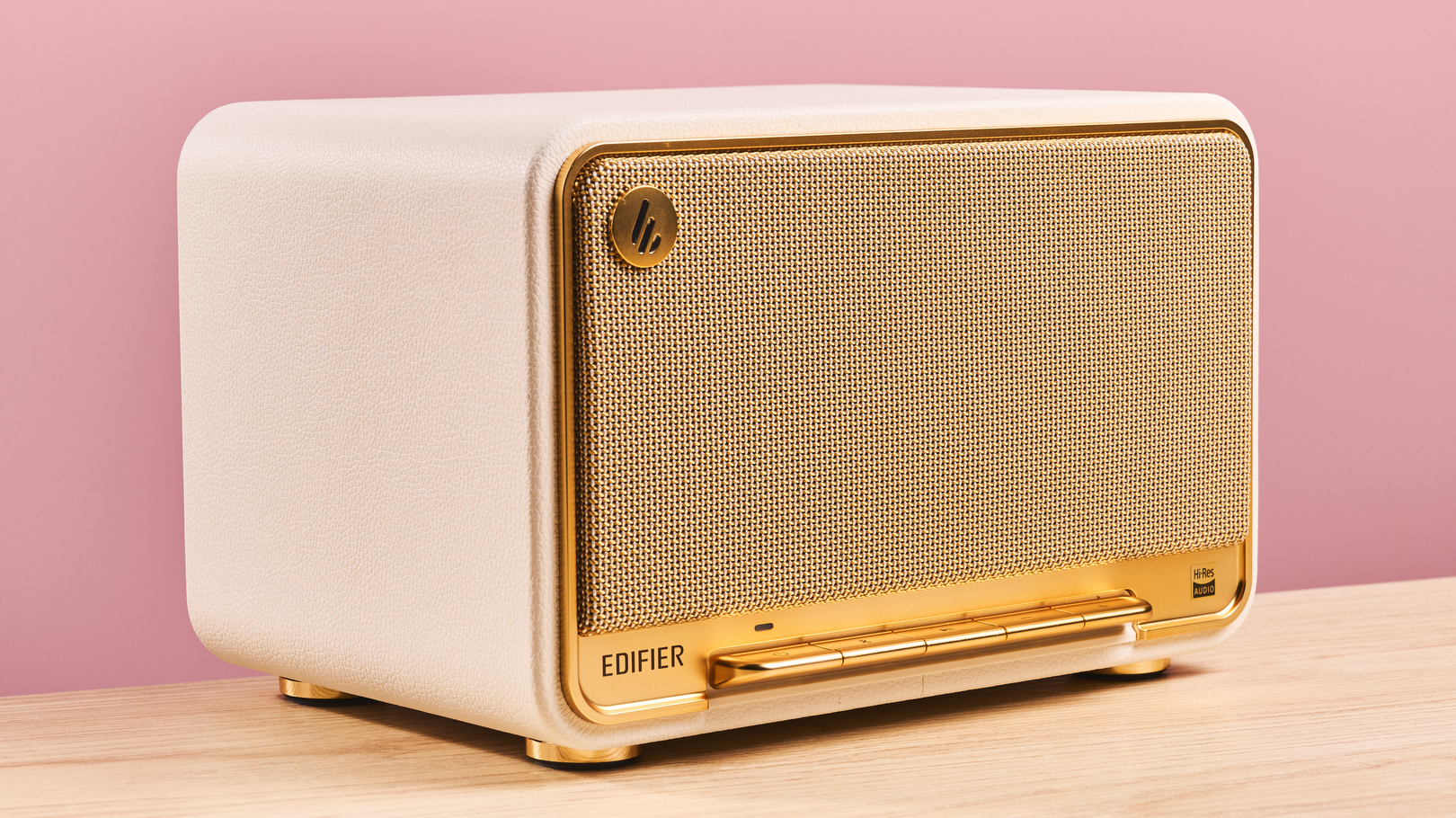
Edifier D32: Two-minute review
Looking for a fresh wireless speaker, which combines old-school charm with hi-res audio capabilities? Thought so. Well, you’re in luck, because the Edifier D32 is just that and at a very reasonable price too.
This amp-like tabletop speaker is a very solid entry from the Chinese audio specialists Edifier and delivers clean, balanced, delicate sound. The Edifier D32 is compatible with both the LDAC and ALAC (when using AirPlay) audio codecs, meaning you’ll get access to hi-res audio regardless of whether you’re an Android or iPhone lover. As well as Bluetooth 5.3 or the 5GHz and 2.4GHz dual-band Wi-Fi module, there’s also AUX and USB-C wired options if you’d prefer, making the Edifier D32 a very versatile option.
Whether you’re a rocker, folk fan or classical connoisseur, the Edifier D32 will deliver talented sound that’s sure to impress you or your esteemed guests. It handles treble frequencies most competently, delivering more delicate sounds with accuracy and precision. Mid-range sounds are also well-weighted with imperfect, yet respectable levels of detail on offer. Even bass comes through with a degree of impact and depth, making for a good all-round listening experience. OK, drum and bass lovers may feel that sub-bass is a bit lacking; audiophiles may even sense that separation doesn’t match up to some of the best wireless speakers. But the vast majority of listeners are sure to like what they hear.
Sound is customizable too, thanks to the Edifier ConneX app. This free companion app allows you to adjust the EQ via a number of presets or a custom option. However, that’s pretty much it as far as in-app features go, so don’t expect anything super fancy here.
Another decent, but non-standout factor is the Edifier D32’s battery life of 11 hours. Some competitors, like the JBL Authentics 300, for instance, can only manage eight in fairness – although a lot of competitors, like Marshall's Stanmore, can give you 15 hours with its retro-style multi-room speaker. This should still be enough for the average gathering, of course, but if you want a speaker for parties or similar events, there are a lot of other low-cost options that offer far superior playtimes.
Potentially the biggest draw of the Edifier D32 is its design. Sure, the JBL Authentics and Marshall Stanmore products have done similar things, but this is considerably cheaper than most options in these lines. The Edifier D32 does a lot right aesthetically, with an attractive, textured outer casing and golden speaker grille. However, some of the gold detail on the White model (which I tested) makes for a slightly less-than premium appearance due to its plasticky look. If you’re looking for the classiest option on the market, this is likely not going to cut it, but it does still keep that old school vibe alive – as long as you don't look too closely.
It’s looking pretty positive for the Edifier D32 here. For what it sets out to do, it succeeds on almost every metric. It may not be a perfect 10 looks-wise or particularly feature-rich, but these things aren’t going to be a number one priority for most. After all, when it comes to audio quality, the Edifier D32 offers plenty of bang for your buck. It’s not the top performing speaker on the market, sure, but with hi-res output using your home's Wi-Fi network,, talented all-round sound and EQ customizability, you’re almost certain to be satisfied with what’s on offer.
So if you’re the nostalgic type and want adept audio at a not-so daunting price, I would recommend the Edifier D32. For lovers of big bass, party vibes and the great outdoors, though, this is probably not for you and I’d recommend checking out our guide to the best party speakers instead.
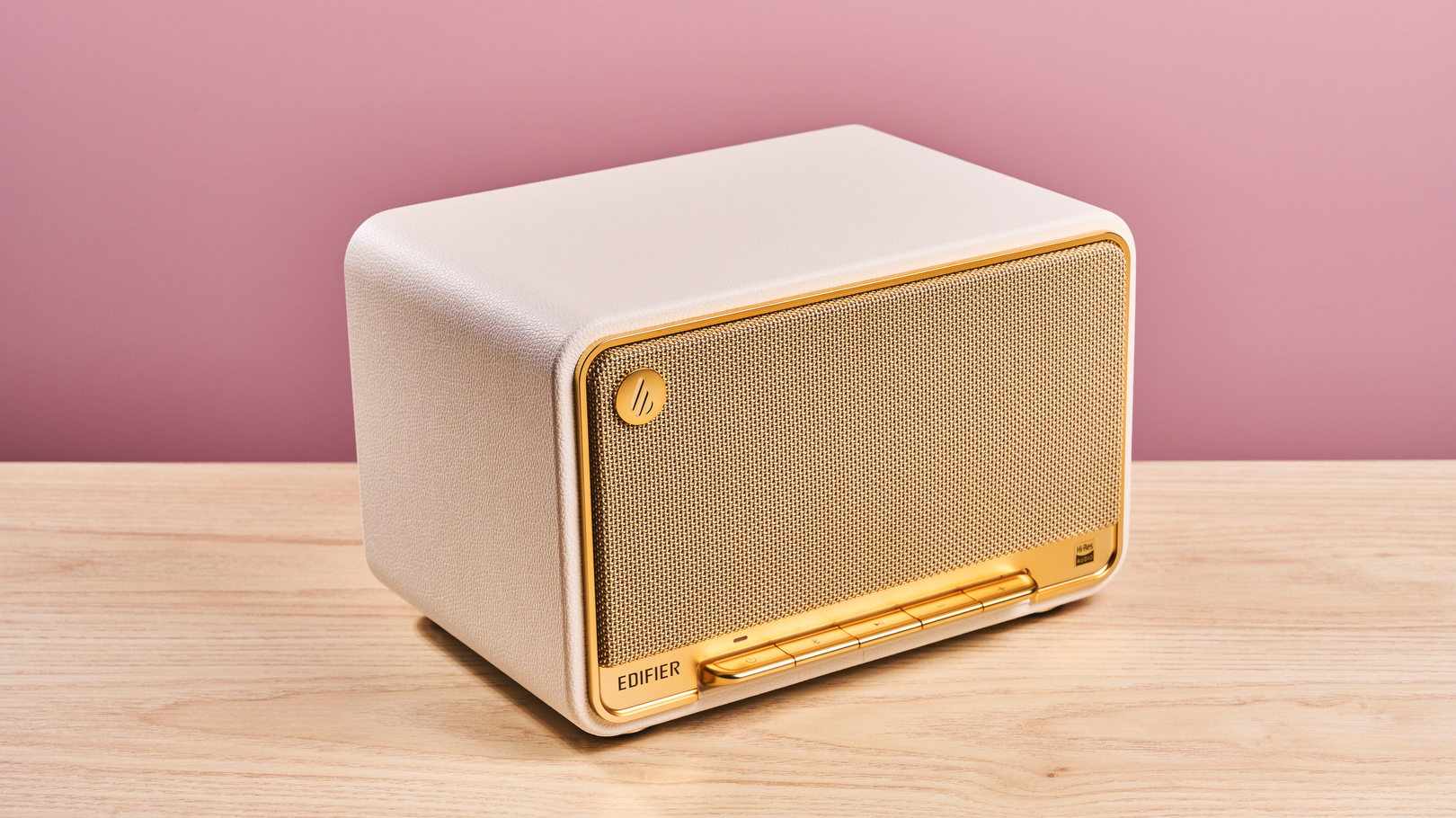
Edifier D32 review: price and release date
- $199.99 / £179.99 (about AU$300)
- Launched on March 2024
The Edifier D32 is available for a reasonable price, given you get hi-res audio, a decent amount of bulk and several good connectivity options, including Wi-Fi and Bluetooth streaming. It has a list price of $199.99 / £179.99 (about AU$300), which is considerably cheaper than a lot of the speakers in JBL’s Authentics line, for instance, a model that attracts those looking for a similarly retro vibe.
The D32 also launched in March 2024, so it still has that fresh feeling about it. Sure, its build quality isn’t quite as high as alternatives from Marshall or JBL, but the savings you recoup even things out nicely.
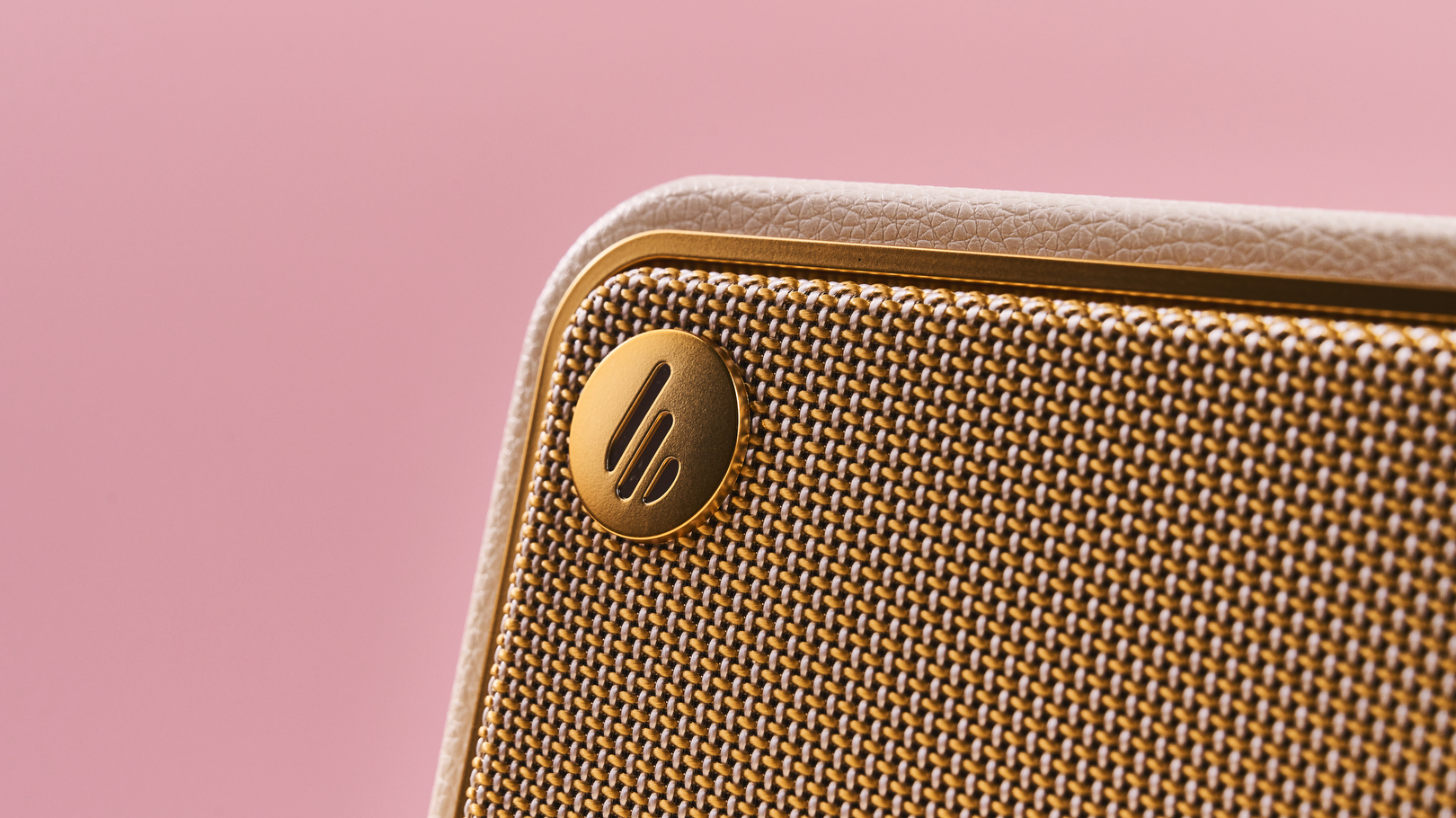
Edifier D32 review: Specs
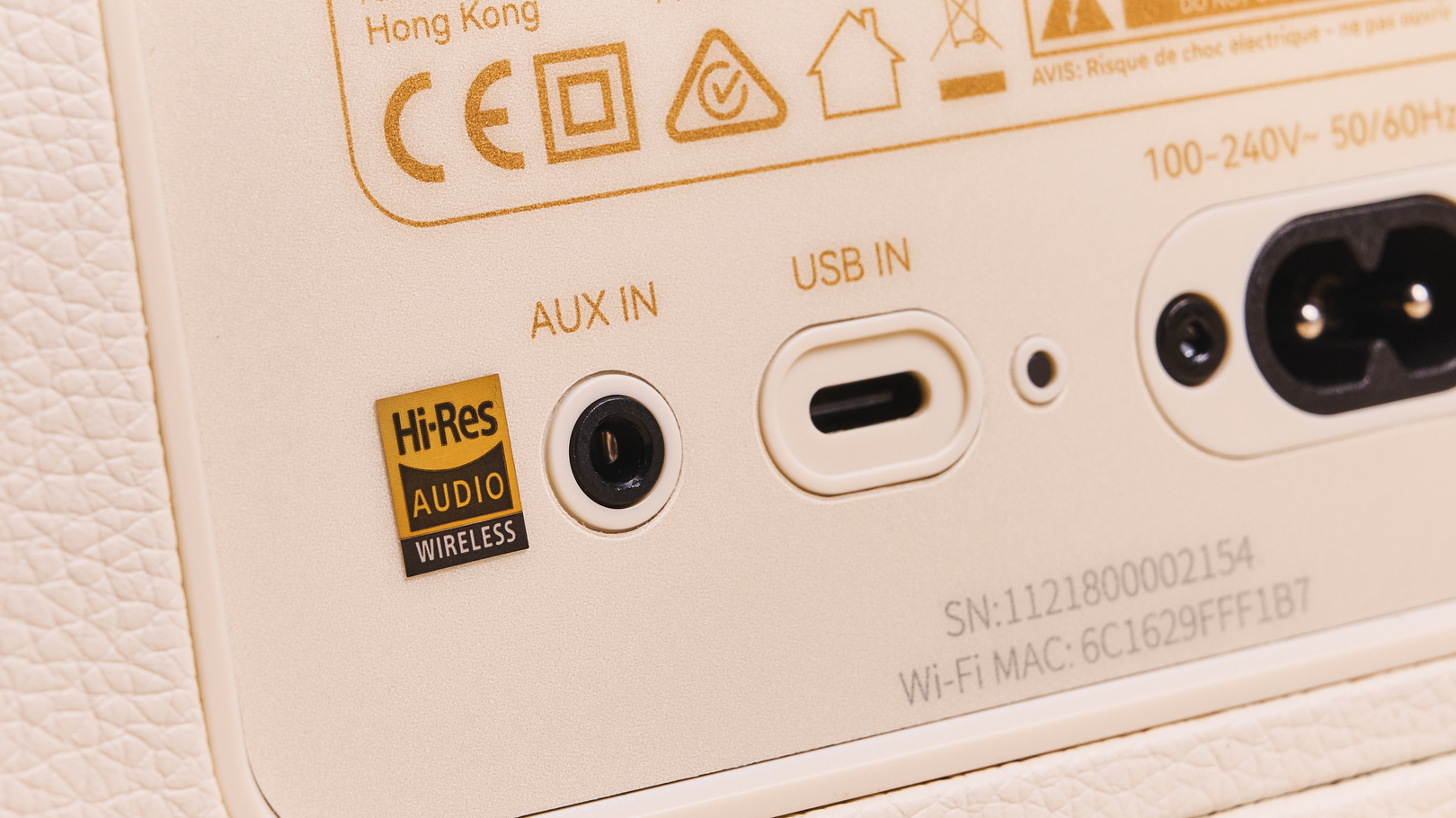
Edifier D32: Features
- Apple AirPlay2, Bluetooth 5.3 and wired connectivity options
- Companion app compatibility
- Average battery life
Features-wise, the Edifier D32 does a lot more than its looks suggest. Firstly, it’s worth noting that it has a good set of connectivity options, which include: Bluetooth 5.3, 5GHz and 2.4GHz dual-band Wi-Fi (and Apple AirPlay), USB-C and AUX for wired listening. Specifically, the Edifier D32 supports Apple AirPlay 2, meaning that you can Wi-Fi stream music using iOS devices, Apple TV, and computers with iTunes installed.
When harnessing Bluetooth connectivity (except when streaming using LDAC), you get access to multipoint connectivity. If you’re hosting a gathering and both you and a friend want to queue up some tracks, it's best to stick to Bluetooth.
If you download the Edifier ConneX app, you can access a few more features, but things are admittedly pretty limited. The only real feature available is what Edifier calls ‘Sound Effects’, which is just an EQ calibration tool. You can select from one of five options: Classic; Monitor; Dynamic; Vocal; or Customized. Although all of these have distinctive sound profiles, I only really found myself using either the well-balanced Classic mode, which enabled me to pick out more sonic details, or Dynamic, whichdiminishes highs in favor of more booming bass.
The app doesn’t have much more going for it really. You can check battery life (although it annoyingly only shows percentages as a multiple of 20), toggle multipoint, turn speaker prompt sounds on or off and view the user manual. That’s basically it – and I’m not really complaining. After all, there’s not a whole lot more I’d expect from a wireless speaker at this price point.
When it comes to battery life, the Edifier D32 is pretty average. Edifier claims that this speaker has a playtime of 11 hours, which I found to be relatively accurate. After playing music at 30% volume for eight hours, the speaker still had 40% of its charge remaining, but of course, if you play at higher volumes using hi-res quality it will die far sooner. Although the Edifier D32’s playtime can’t rival retro-looking competitors like the Marshall Emberton 2, with its 30-hour battery, 11 hours will almost definitely be enough for playing tunes at a party or gathering.
It would be nice to have something akin to a battery saver mode, like JBL’s Playtime Boost, or a setting to calibrate the speaker’s sound to its surroundings, like Marshall’s Placement Compensation. But, all in all, the Edifier D32’s feature-set is decent.
- Features score: 3.5/5
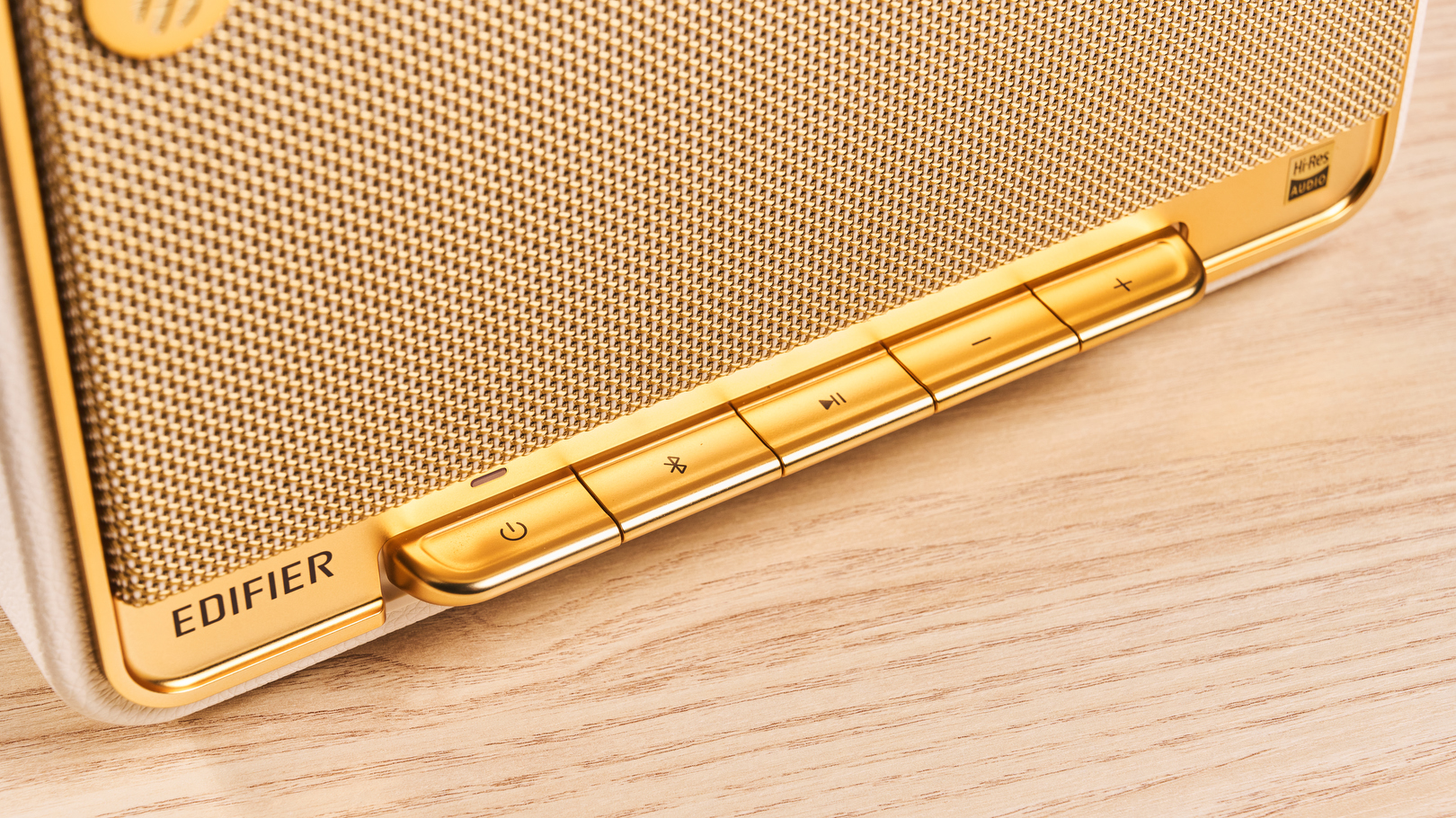
Edifier D32: Sound quality
- Well-balanced hi-res audio
- Crisp highs and clean bass
- Impressive levels of detail for price
OK, so you’re not going to lose your mind over how good the Edifier’s D32 audio sounds, but it’s undeniably strong for its price. Firstly, it’s worth noting that I mainly used the D32’s more balanced EQ preset, Classic, when listening to tracks, although I did dip into Dynamic mode for more bass-heavy bangers.
Something I was delighted to find, straight off the bat, is that the Edifier D32 supports the LDAC codec, which processes audio up to 24-bit/96kHz. This is wonderful news for anyone with a modern Android phone, as almost all of these support the codec. The D32 also supports Apple’s ALAC ‘lossless’ audio codec, but only if you’re using AirPlay mode – ie over Wi-Fi. Even some of 2024’s more expensive Bluetooth speakers – like the JBL Xtreme 4 – don’t support any lossless codecs, (because remember, Bluetooth streaming by its very nature incurs loss) so this is a big win for a speaker costing less than $200 / £200 / AU$300.
OK, so the Edifier is compatible with some levelled-up Bluetooth codecs and AirPlay support using Wi-Fi, but how does it actually sound? Well, I whipped out my trusty FiiO M11S and opened up Tidal to give it a whirl and was pleasantly surprised by the quality on offer. I tuned into Black Eye by Allie X and the Edifier effectively captured the dynamism of the intro’s bass bouncing up to the mid-range, resulting in a controlled yet energetic sound. The Edifier can achieve respectable bass depth; for instance, deep synths placed throughout the song 635 South by FORQ sounded very clear, maintained their boom and didn’t distort, even at higher volumes.
It’s not an entirely perfect picture when it comes to low-frequencies, though. If you’re looking to hear imposing bass, you might want to look elsewhere. For instance, when listening to Diva Bonita by bbno$, the sub-bass was a little lacking for clout and impact in the mix. I tried the (admittedly more expensive) JBL Xtreme 4 and it was able to perform better in this department, so if you’re really into ultra low-frequency rubbles and feels, weigh up other options.
However, it’s not about bass with the Edifier D32. With its retro aesthetic, it’s clearly not trying to be a party speaker with intense low-end capabilities, even though it’s still very much competent in this area. And the positive news is the D32 sounds very good overall, with both rich mids and elegant highs.
I listened to Rains again by Solji and the rain sound effects in the intro sounded pretty natural, with the vocalist’s delicate, high-pitched vocals coming through in a crisp manner and retaining their atmospheric edge. There wasn’t any noticeable warping or distortion when listening to this track and even when flicking through the TechRadar testing playlist, I constantly felt that songs relying on treble performance sounded neat.
The Edifier D32 isn’t always the best with more subtle details. For instance, the electric guitar throughout Young Blood by The Naked and Famous was a bit more muted in the overall mix than I would’ve liked. When returning to Black Eye by Allie X, I similarly sensed that light electronica in the middle of the track was a bit lacking – noticeable, sure – but just not as clear-cut as it could be. This is nitpicking I accept, especially given the price you pay, but it is my job to do so.
All in all, the Edifier D32 may not be the boldest-sounding speaker on the market and it may not possess the ability to paint perfectly accurate sonic pictures – but that doesn’t prevent it from being a great-sounding wireless speaker. You’re still getting super-clean, on-beat, hi-res audio certain to impress. If you’re looking for a more party-ready speaker with the most hard-hitting bass, this isn’t the optimal choice, but if you want high-quality audio for laid-back listening, the Edifier D32 is a strong option.
- Sound quality score: 4/5
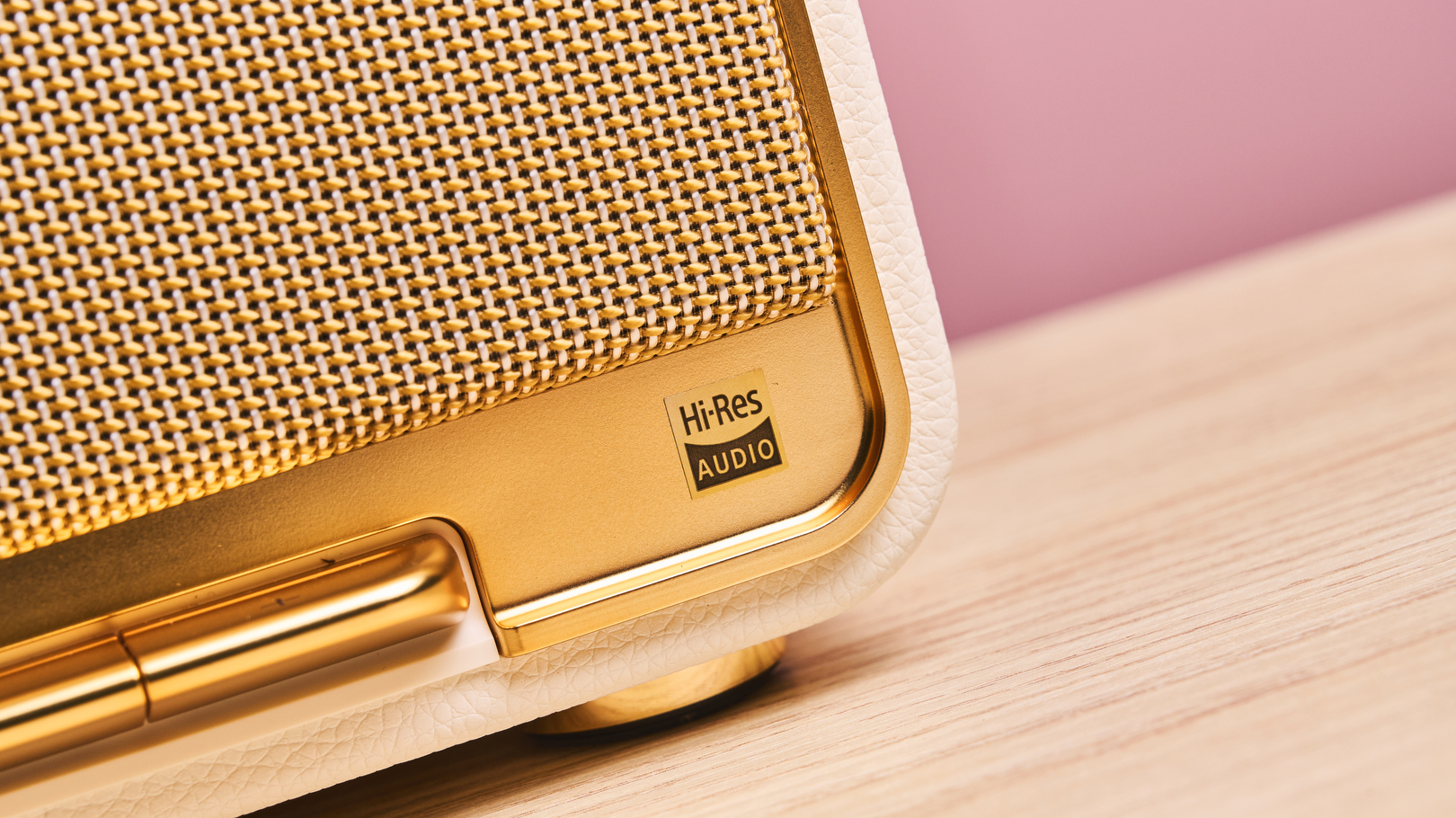
Edifier D32: Design
- Retro aesthetic
- Gold details a bit cheap-looking
- Designed for tabletop play but has decent portability
Whether you’re a guitarist, rock fan, or just one of those people that claims to be ‘born in the wrong generation’, the Edifier D32’s design is likely to appeal to you. That’s because it has a retro, amp-like look that is fitting for those hoping to add a splash of vintage flair to their living space. I tested the White color variant and found that the bronze speaker grille and outer casing were stylish and satisfying on the eye.
However, I’m not gonna lie: the overall look of the Edifier D32 is slightly ruined by the golden finish on the protruding button controls, feet and outer rim. The plasticky, gold finish looks a bit cheap; tacky even. This prevents it from exuding the classy vibe of Marshall’s Emberton or Stanmore lines for instance, and it damages the retro look Edifier was going with here. This speaker is by no means bad to look at, but the inconsistent quality did stop me from falling head over heels, design-wise.
Although I wasn’t a massive fan of the look of the buttons, they’re fairly easy to use. There are power, Bluetooth, play/pause and volume controls, all of which are super-straightforward with the exception of one. That exception is the power button, which has a light panel that can flash in nine different ways, including different colors and flashes. You’ll need to consult the user manual to understand what each of these means, because at first, I found myself baffled by whether the speaker was on, off, or somewhere in between.
Otherwise, this is a pretty practical device. It’s only a little bit heavy at 6.7lbs / 3kg and has a handle on the back of the speaker for easier transportation. Really, though, this isn’t the best option if portability is crucial for you. But for a tabletop wireless speaker, I’d argue that it’s the perfect size – not huge and overbearing, but not too small to deliver quality, room-filling audio.
In order to deliver that room-filling audio, the D32 holds two 15W silk dome tweeters as well as what Edifier calls a "long-throw, mid-low" driver. They’re encased in an MDF cabinet, designed to reduce resonance and distortion. This setup definitely helps to deliver a strong balance of loudness and clarity, making the Edifier D32 very pleasant to listen to.
Overall, this isn’t the most elegant retro-style Wi-Fi speaker on the market, but it’s considerably cheaper than comparable alternatives from JBL and Marshall. It may be the case that you, reader, think I’m terribly mistaken about the gold looking tacky! However, one thing that can’t be disputed is that this is a nicely weighted and sized tabletop speaker that still offers adequate portability – combine that with the strong audio quality on offer and you’re onto a winner with the Edifier D32.
- Design score: 3.5/5
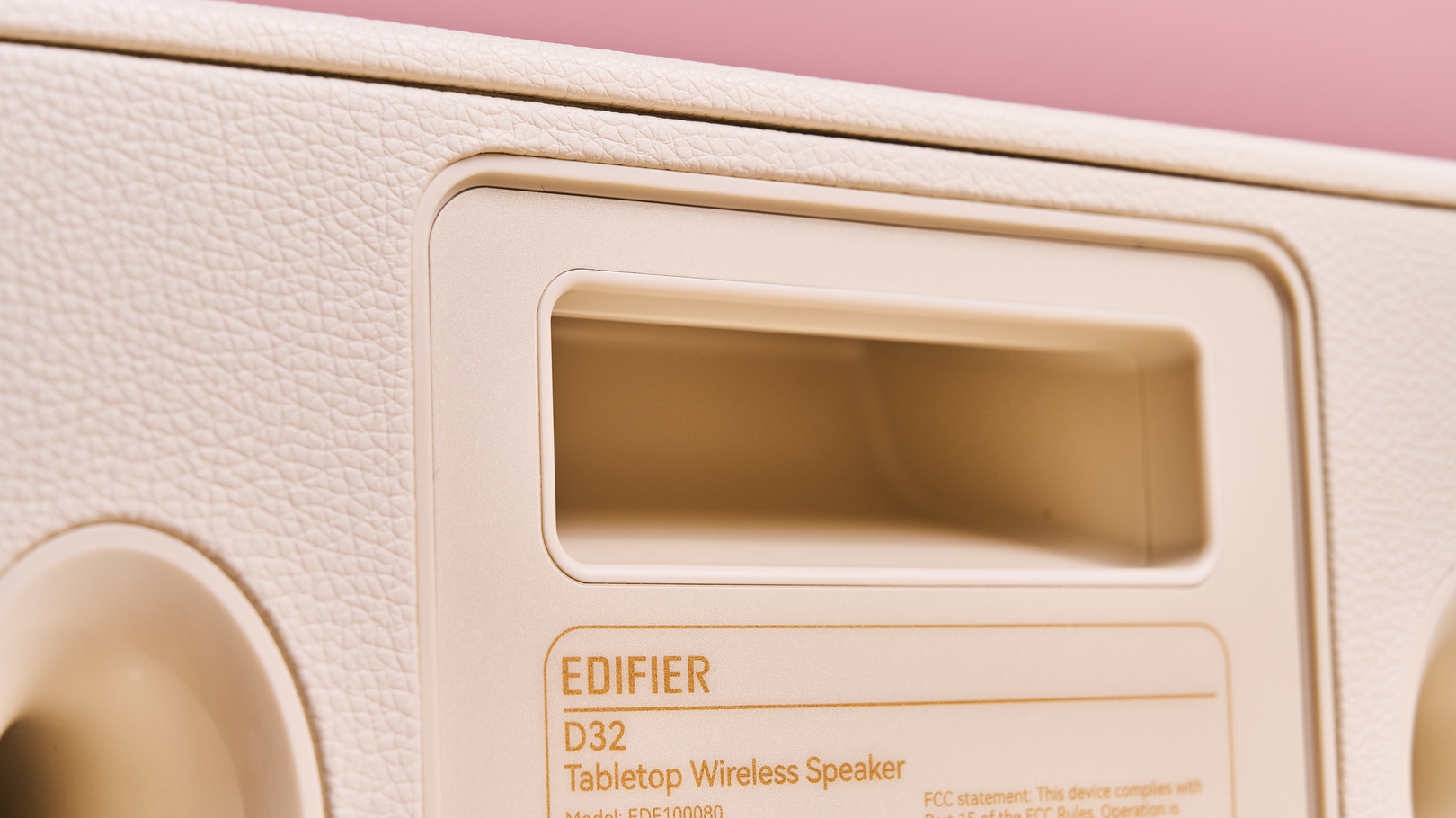
Edifier D32: Value
- Much cheaper than similar competitors
- Great sound quality for the price
- There are still cheaper alternatives out there
Let’s be clear: if you’re looking for a super low-price Bluetooth speaker, the Edifier D32 is probably not your best option. Sure, it’s inexpensive compared to a lot of its rivals, but there are plenty of good Bluetooth speakers out there closer to the $100 / £100 / AU$200 mark.
However, if you’re specifically on the hunt for a tabletop speaker with an old school vibe, this is really strong in the value department. You get both wired and wireless (Wi-Fi and Bluetooth) higher-resolution audio, strong connectivity options and companion app compatibility all for $199.99 / £179.99 (about AU$300). That’s not bad at all, especially considering that the cheapest in JBL’s Authentics line, the JBL Authentics 200 has a list price of $349.99 / £249.99 / AU$499.95.
What matters the most with a wireless speaker is sound – and the Edifier D32 performs very nicely in this category. When you couple that with the appeal of its design and consider the high cost of competitors, the Edifier D32 is a very solid value pick.
- Value score: 4/5
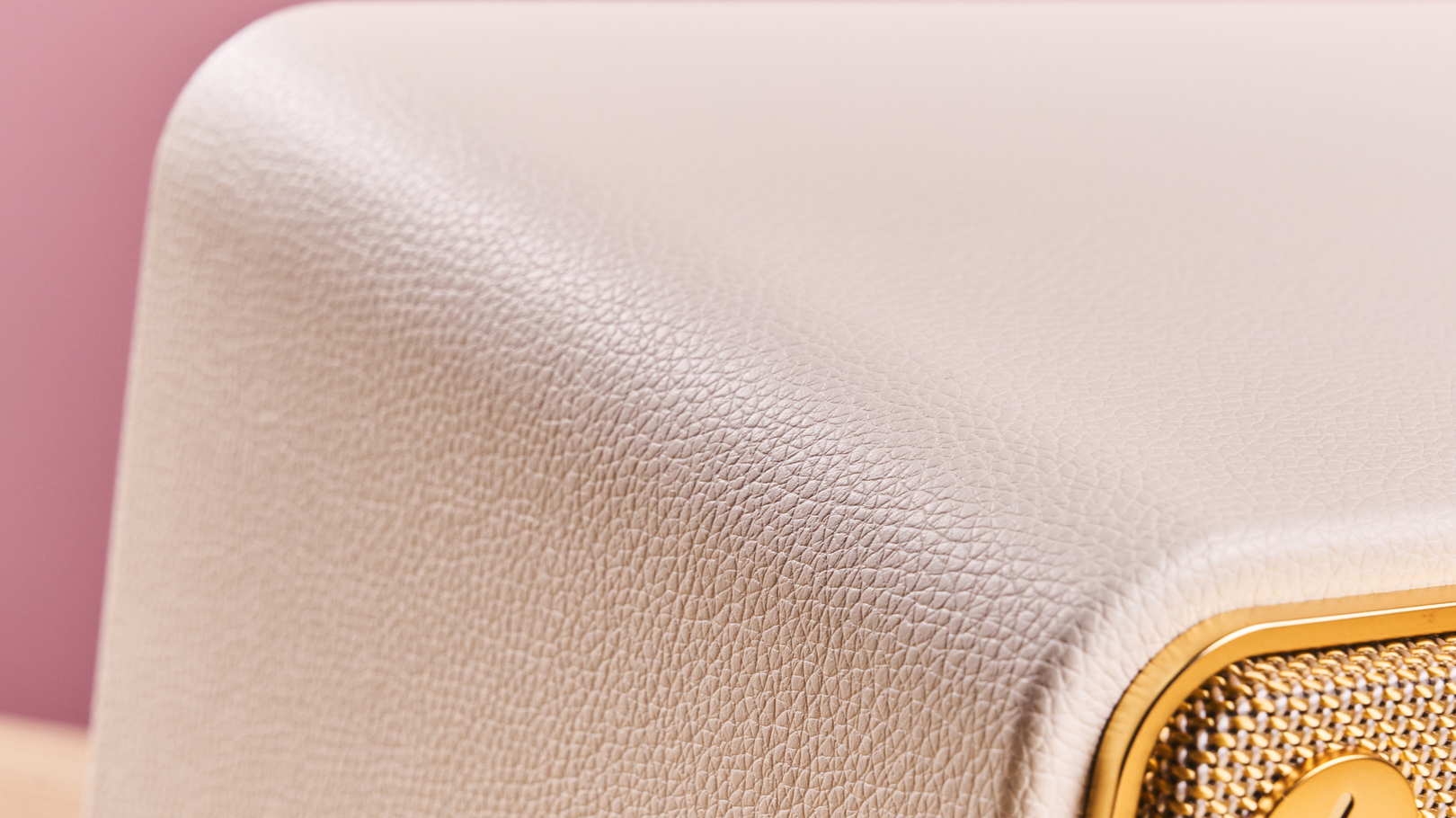
Should I buy the Edifier D32?
Buy it if...
Don't buy it if...
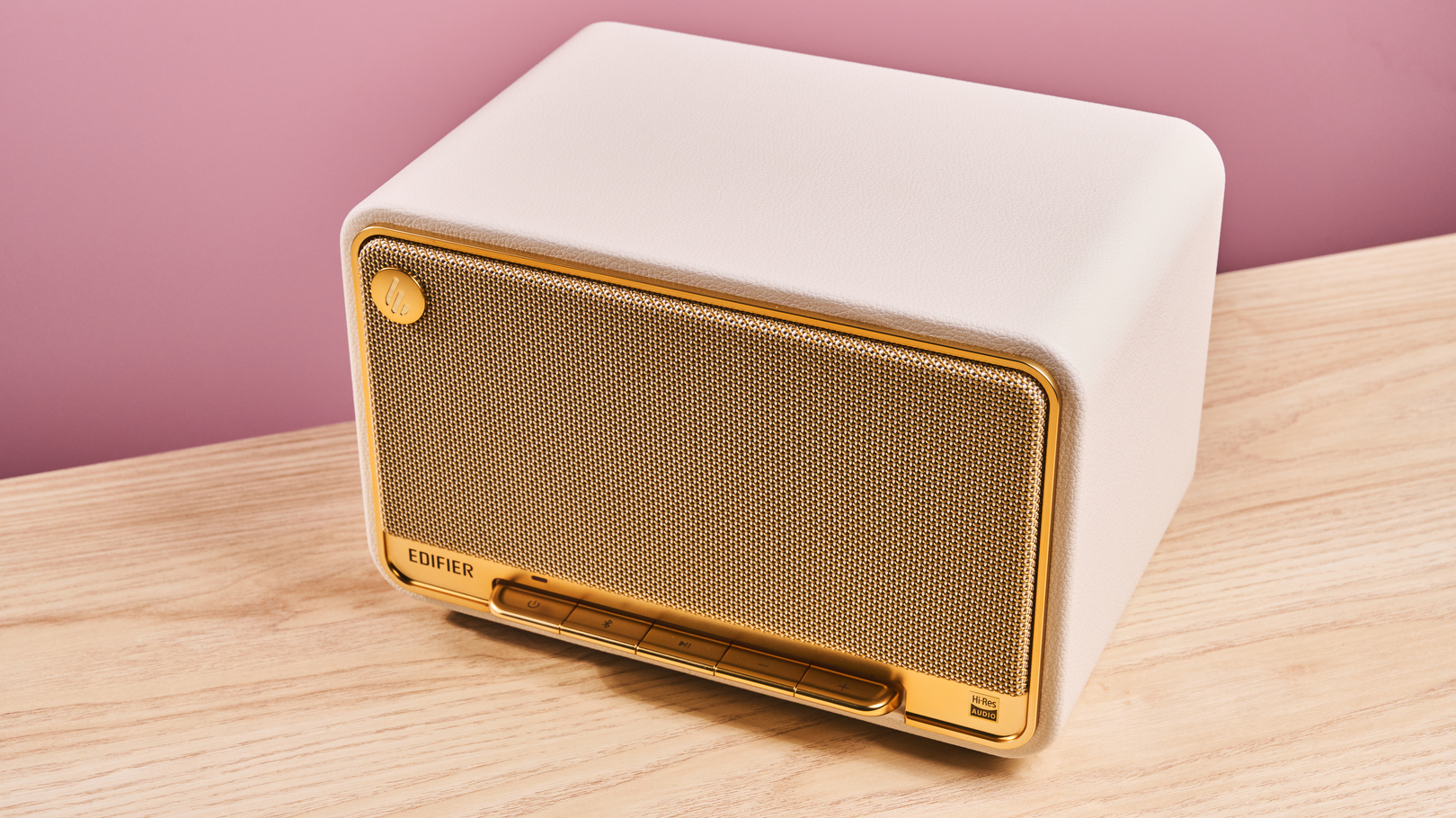
Edifier D32: Also consider
Edifier D32 review: How I tested
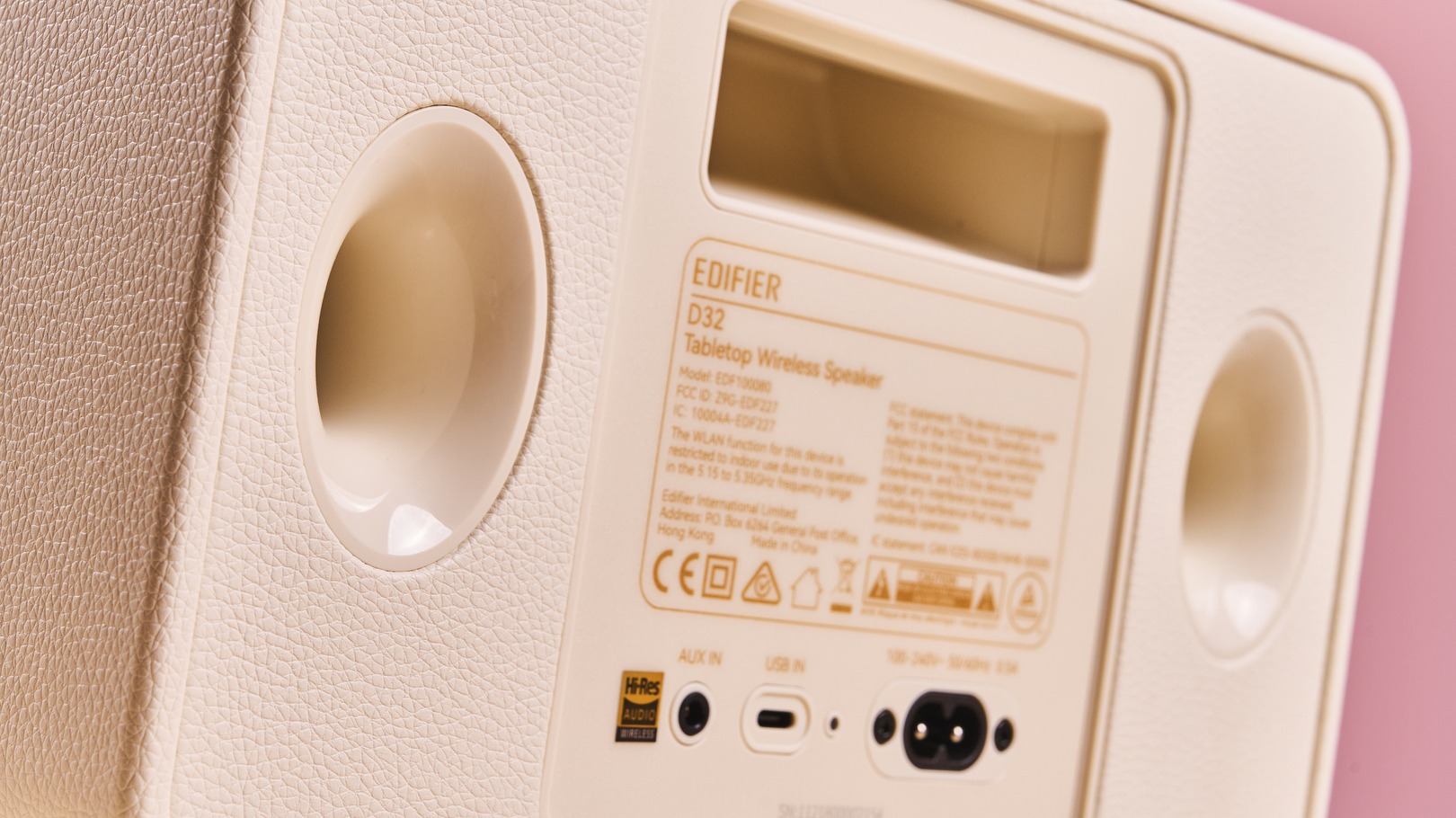
- Tested for two weeks
- Used in the office and music testing studio
- Tested using Tidal on Fiio M11S and Samsung Galaxy Z Flip 4
I spent hours listening to music on the Edifier D32, testing it across its various sound modes and at differing volume levels. I predominantly used the speaker in our music testing room for assessing audio quality and battery testing.
I used Spotify on my Samsung Galaxy Z Flip 4 and Tidal on the Fiio M11S hi-res music player to stream tracks from our carefully curated TechRadar reference playlist. This included songs with pumping deep bass, delicate vocals, and complex mixes, enabling me to test a speaker’s full range and dynamism across different frequencies. I also used the JBL Xtreme 4 as a point of comparison, when appropriate.
- First reviewed: September 2024
- Read more about how we test







